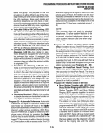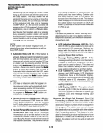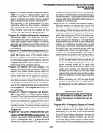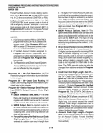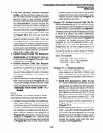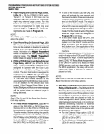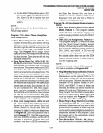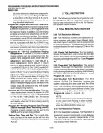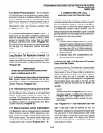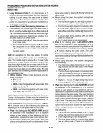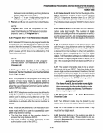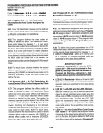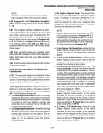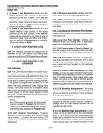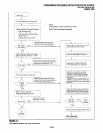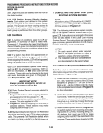
3.12 Station Priority Classes 1 - 4: Four classes
of Toll Restriction can be defined to assign differ-
ent levels of priority to individual stations. Classes
can be defined so each is progressively more
restrictive by allowing or denying specific area or
office codes, calls to long distance information,
international calls, and operator assisted calls
(Programs 46-10 - 40).
3.13 Office Code Exception Tables: Class 1 - 4
restrictions can be further modified by defining as
many as eight exception tables to allow or deny
access to specific office codes that fall within
previously restricted area codes (Program 47).
Exception office code access is accomplished with
the Six-digit Toll Restriction method described
earlier.
3.14 Emergency, Information, and Toll-free
Long Distance Toll Restriction Override: Toll
restricted stations may be allowed to dial special
codes such as 911 for emergency response, I-41 1
or 411 for information, or 800 prefix toll-free calls
(Program 46).
IMPORTANT!
Always be sure to provide access to emer-
gency numbers such as 911.
3.15 Toll Restriction Override by System Speed
Dial: System Speed Dial numbers can be pro-
grammed to override Toll Restriction (see Basic
System Features, Program IO-I).
3.16 Toll Restriction/Traveling Class Override
Codes: Up to two Toll Restriction Override Codes
can be defined. When dialed at a Toll Restricted
station, these codes enable the station user to
override Toll Restrictions defined at the station
(Program 44B or 45-8 - 9). Codes may be changed
by stations chosen in programming (see Basic
System Features, Program 30).
3.17 Special Common Carrier Authorization:
Toll Restriction can be programmed to recognize
Other Common Carrier (OCC) telephone num-
bers, directory numbers, authorization codes, and
PBX access codes. The system starts inspecting
numbers for Toll Restriction purposes after the
recognizable code is dialed (Program 45-3 - 6).
PROGRAMMING PROCEDURES-INSTRUCTIONS/SYSTEM RECORDS
SECTION 100-816-302
MARCH 1993
4 COMPLETING THE TOLL
RESTRICTION SYSTEM RECORD
4.01 The following instructions explain how to
complete System Record Sheets used to program
the Toll Restriction feature. They are arranged in
the same order in which the tables appear in the
To// Restriction System Record Sheets. The fol-
lowing instructions are intended to give a concise
general definition of the programming characteris-
tics defined by each record sheet.
NOTES:
1. On each record sheet, mark an X in the
space provided to indicate that a choice is
selected. Unless otherwise specified, this
indicates the LED is lit. When appropri-
ate, indicate digits to be entered using the
station dialpad.
2. Initialized data and considerations are
documented when applicable.
4.10 Program 44B-Toll Restriction/Traveling
Class Override Codes
4.11 Each of the four Toll Restriction classes estab-
lished in Program 46 can be assigned a code with
this program. If one of these codes is entered at a
station, the station will assume the code’s class for
that call. When the call is complete, the station
returns to its regular class assigned in Program 48.
The traveling class code data is not sent out the
SMDR port and will not print out on station call
records.
NOTE:
Stations selected in Program 30, LED I6 ON,
can add, change, or delete the codes set in
Program 448. See Program 30 for more in-
formation regarding station revision of over-
ride codes.
4.20 Program 45-I-Toll Restriction Dial Plan
4.21 A dial plan must be defined for the Toll
Restriction software to recognize the typical dial-
ing sequence of long distance/local calls made
from the system’s home area code and to identify
area and office codes. The dialing plan defines
several components of a telephone number for
long distance calling:
2-23



